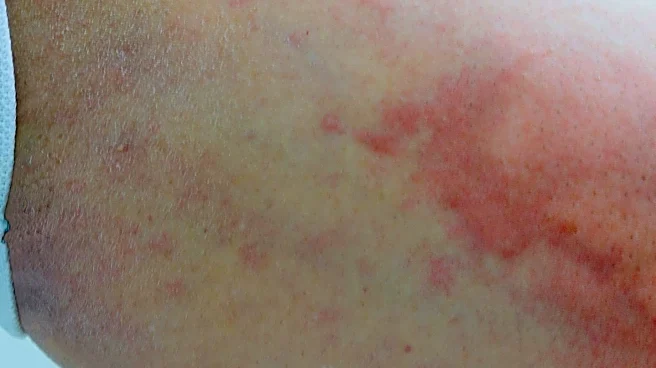What is the story about?
What's Happening?
Researchers at the University of Oregon have developed a new drug combination that shows promise in treating chronic wound infections caused by the bacteria Pseudomonas aeruginosa. Led by Assistant Professor Melanie Spero, the team combined antibiotics with small doses of chlorate, resulting in a treatment that is 10,000 times more effective than antibiotics alone. This approach could significantly reduce the medication dosage required, potentially lowering the risk of toxicity and shortening treatment duration. The study, published in Applied and Environmental Microbiology, highlights the potential of this combination to combat antibiotic resistance, particularly in hypoxic environments where traditional antibiotics often fail.
Why It's Important?
The development of this antibiotic-chlorate combination is significant as it addresses the growing issue of antibiotic resistance, a major public health concern. Chronic wounds, such as diabetic foot ulcers, affect approximately 2% of the U.S. population and often lead to severe complications, including amputations. By enhancing the efficacy of existing antibiotics, this new treatment could improve patient outcomes, reduce healthcare costs, and decrease the duration of antibiotic use, thereby minimizing side effects and the disruption of gut microbiota. The research underscores the importance of innovative approaches in the fight against resistant bacterial infections.
What's Next?
The next steps involve translating these promising lab results into clinical settings. Researchers aim to explore the effects of the drug combination on complex microbial communities in chronic infections. Understanding the mechanisms behind the synergy of chlorate and antibiotics could lead to the development of new therapeutic strategies and rational drug design. Further studies are needed to confirm the safety and efficacy of this treatment in humans, potentially paving the way for new solutions in managing chronic infections and antibiotic resistance.
Beyond the Headlines
This research highlights the potential of repurposing existing compounds, like chlorate, to enhance antibiotic effectiveness. The study also emphasizes the need for a deeper understanding of bacterial metabolism and the environmental conditions that contribute to antibiotic resistance. By focusing on the cellular stresses imposed by drug combinations, scientists can uncover new pathways for drug development, ultimately leading to more effective treatments for resistant infections.














